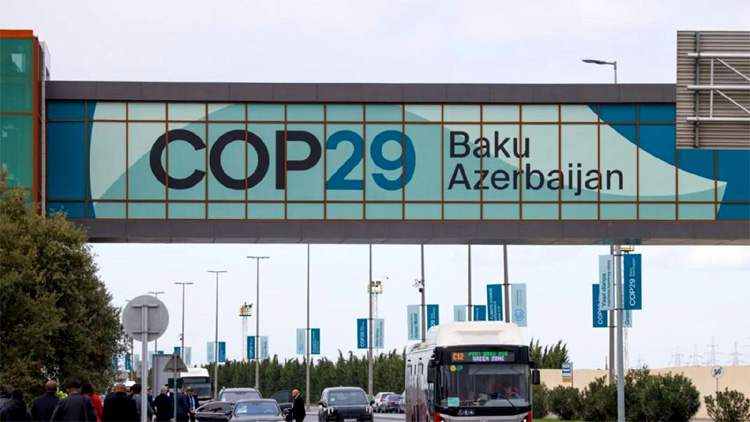COP29 Presidency draft text continues to keep NCQG quantum bracketed
A streamlined compilation of proposals of the 2024 UN Climate Change Conference (COP29) Presidency’s draft decision text on the New Collective Quantified Goal (NCQG) is down to 10 pages compared to 25 in the previous versions. Now it has largely two ministerial options on the overall goal but still has not put numbers.
One proposal seeks to establish a NCQG on climate finance of at least USD [X] trillion of dollars annually from 2025-2035 provided and mobilised from developed to all developing countries. It proposes to address their evolving needs in grants or grantequivalent terms of new, additional, affordable, predictable, non-debt inducing and adequate climate finance for adaptation, mitigation and loss and damage to support developing country Parties in a country-driven manner in the implementation of their National Determined Contributions.
It adds developed country Parties shall provide at least USD [X] billion per year in grants or grant-equivalent terms referred to as provision goal to support the achievement of the mobilisation. The draft invites developing country Parties willing to contribute to the support mobilised to developing countries to provide such support voluntarily as per Article 9.2 of the Paris Agreement. The voluntary support shall not be accounted for in the NCQG.
The draft suggests burden-sharing arrangements for developed country Parties based on historical emissions and GDP per capita in the delivery of the goal.
The other ministerial option is to set a new NCQG for climate finance to increase the scale of global finance for climate action to contribute to the achievement of the long-term goals of Article 2 of the Paris Agreement with an emphasis on pursuing efforts to limit the temperature increase to 1.5 °C above pre-industrial levels.
Again the quantum is bracketed at USD[X] trillion per year by 2035 from all sources of finance, including domestic resources, recognising the importance of significantly scaling up finance to and in developing countries taking into account their needs and priorities, and underscoring the need to support levels of ambition expressed in national planning instruments.
It aims to gradually improve the global data available to track financial investments in climate action, including data not currently captured under formal reporting systems. In accordance with Article 9, Paragraph 3 of the Paris Agreement, and as a core element of achieving the ambition outlined in Paragraph 2, establishes a goal of collectively mobilizing USD [a floor of 100bn +] billion per annum by 2035 for developing countries from a wide range of sources and instruments including public, private and innovative sources, from bilateral and multilateral channels, in the context of meaningful mitigation action and ambition.
It provides for more stringent monitoring of donors. “Affirms that all countries who are making efforts to mobilise finance shall report these in their Biennial Transparency Reports, and for tracking reports referred to in to count all other efforts, using the best available data.”
These options may not go down well with developing countries because they do not capture the numbers yet and the second option is more focused on reporting of contribution of financial contributions from all sources.
HT reported on November 20 that developing countries have clarified that expanding the contributor base to include high-income, developing countries would violate the provisions of the Paris Agreement, countering one of the arguments of developed countries concerning the NCQG.
NCQG is the new climate funding target, the money the developed world will give to the developing world to support their climate actions after 2025. It is meant to build on the $100 billion a year funding that the developed world agreed to give the developing world in 2009, but which it finally did (depending on how it is calculated), in 2022.
Developing countries are clear that with several proposals to expand the contributor base being discussed, it is important to understand that what developing countries, especially China and others may contribute to South-South solidarity is outside the ambit of NCQG.
“It is voluntary and there is no obligation on developing country parties to contribute to NCQG. We are here to discuss NCQG under the Paris Agreement. The Agreement clearly states that money will flow from developed to developing countries. We are not here to renegotiate that,” a developing country negotiator said on Wednesday.

